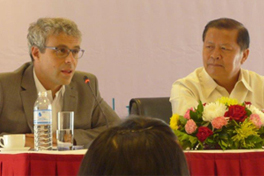 Dr Bounthong Bouahom, Director General of the National Agriculture and Forestry Research Institute (NAFRI), co-chaired the event together with Prof. Laurent Goetschel, President of the Swiss Commission for Research Partnerships with Developing Countries (KFPE).
Photo: CDE
Dr Bounthong Bouahom, Director General of the National Agriculture and Forestry Research Institute (NAFRI), co-chaired the event together with Prof. Laurent Goetschel, President of the Swiss Commission for Research Partnerships with Developing Countries (KFPE).
Photo: CDE
Delegates from various Lao Government institutions met to exchange and learn about ways in which scientists and policymakers can engage with each other most fruitfully. “The Lao agricultural sector is in transition – and we know we need to ensure the sustainability of the country’s socio-economic development. For this, we need better coordination and cooperation among different research institutes, and reliable research results that can be used to make sound and relevant policies,” said Dr Bounthong Bouahom, Director General of the National Agriculture and Forestry Research Institute (NAFRI), emphasizing the need for continuous learning and sharing of experiences among researchers and policymakers.
Dr Bounthong co-chaired the event together with Prof. Laurent Goetschel, President of the Swiss Commission for Research Partnerships with Developing Countries (KFPE), who highlighted the importance of tailoring policies to the Lao context: “Scientists like to seek general knowledge, but in policymaking it is important to know that context matters.” While awareness is growing about the need to improve integration of research and policy, concrete ways of doing so are still being explored.
The two-day “Workshop on Science–Policy Engagement” was held on 8-9 September 2015 at the Vientiane Plaza Hotel. It was a follow-up to the country’s first ever high-level Science–Policy Exchange (13-14 February 2014) and the National Research for Development Forum (17-18 December 2014), whose purpose was to create a space for dialogue between the various parties.
The workshop kick-started this dialogue with a series of exercises. First, the 25 participants from various ministries including NAFRI, the National Economic Research Institute (NERI), the Economic Research Institute for Trade (ERIT), and the Natural Resources and Environment Institute (NREI) were encouraged to work together in groups and reflect on how they engage with policymakers on a daily basis. Second, the participants came up with key policy issues affecting rural development – ranging from issues as diverse as food and nutrition security, access to markets, control of pesticides in agriculture, and women’s empowerment – and classified these into national, district, provincial, and community-level issues. In a third step, the participants identified points of contact for each concern, realizing that some issues would require the expertise of a number of ministries and highlighting the complexity of rural development.
Finally, the workshop identified potential platforms for science and policy engagement. One of these is NAFRI’s Policy Think Tank, which is expected to play a pivotal role in bringing research and policymaking closer together.
The workshop was co-hosted by NAFRI, the Swiss Commission for Research Partnerships with Developing Countries (KFPE), and the Centre for Development and Environment (CDE) of the University of Bern, Switzerland.